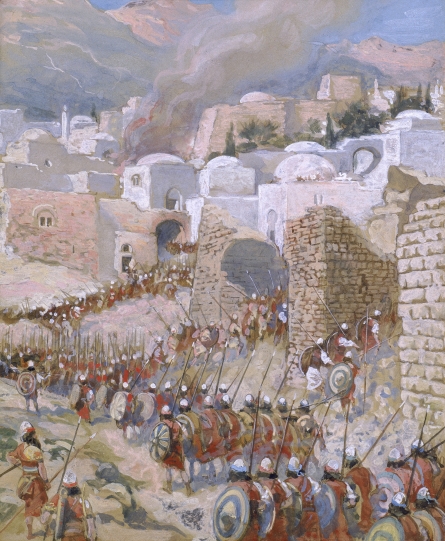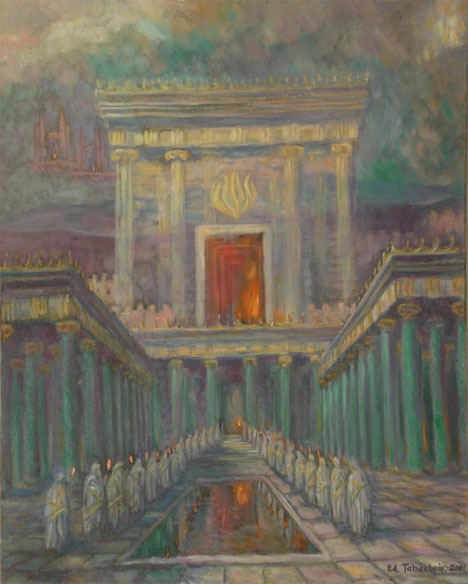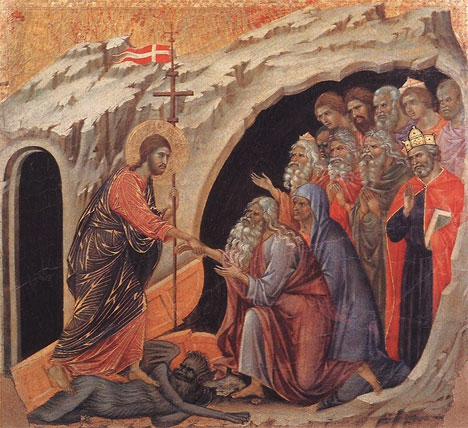Aug
8
2013

“But now they desire a better, that is, a heavenly country. Therefore God is not ashamed to be called their God, for He has prepared a city for them.” (Hebrews 11:16)
The narrative of the Bible is fairly linear until we get to the kings. But once we hit the prophets the Scriptures turn into a box of puzzle pieces. The literature of the kings used Mosaic symbols to a certain degree but the prophets took all the concrete things we learned from the priests and kings and used them to make amazing promises that never quite materialized. Or did they?
Continue reading
3 comments | tags: AD70, Millennium, New Jerusalem, Postmillennialism, Revelation 20 | posted in Bible Matrix, Biblical Theology, The Last Days
Aug
6
2013
 You Shall Likewise Perish
You Shall Likewise Perish
Peter Leithart has posted a response from Joe Rigney concerning the meaning of Luke 12-13. We had a look at the structure of these chapters here recently (See 666 in the Gospel of Luke), so I thought it would be interesting to see how these two approaches “speak to each other.”
Continue reading
Comments Off | tags: AD70, Joe Rigney, Literary Structure, Luke, Peter Leithart | posted in Bible Matrix, Biblical Theology, Quotes, The Last Days
Jul
3
2013
 James B. Jordan was the first Bible teacher I ever heard who had an opinion on the gift of tongues in relation to the rest of the Bible. This gent cops a lot of criticism from the establishment for various things, but he is one who really “gets” the Bible. This is because he asks the right questions. And, without being too harsh, he most often makes all the other theologians and Bible teachers in any debate, on both sides of the debate, look like kindergarten children.
James B. Jordan was the first Bible teacher I ever heard who had an opinion on the gift of tongues in relation to the rest of the Bible. This gent cops a lot of criticism from the establishment for various things, but he is one who really “gets” the Bible. This is because he asks the right questions. And, without being too harsh, he most often makes all the other theologians and Bible teachers in any debate, on both sides of the debate, look like kindergarten children.
Continue reading
1 comment | tags: AD70, Babylon, Corinthians, Luke Welch, Numbers, Systematic typology, Tongues, Trumpets | posted in Biblical Theology, Quotes, The Last Days
Jun
24
2013

or Who Is The Real Jericho?
Atheists love to embarrass Christians with a snide reference to the story of Elisha setting two bears upon some helpless children. What nobody, even Christians, seem to get is the “Covenant significance” of all the players in the story, harking back to Moses. The prophets were, after all, God’s “repo men.” [1]
[This post has been refined and included in Sweet Counsel: Essays to Brighten the Eyes.]
Continue reading
Comments Off | tags: AD70, Covenant curse, Covenant Theology, Egypt, Elisha, Feasts, Herod, Jericho, Jezebel, Kings, Leviticus, Peter Leithart, Pharaoh, Revelation | posted in Apologetics, Bible Matrix, Biblical Theology, The Last Days
May
9
2013
 The first verses of 2 Thessalonians 2 have been an unnecessary battle ground. The Day of the Lord would not come until after the Man of Sin had been revealed. This reasoning seems obvious to Paul. It should be obvious to us if we know the early chapters of Genesis and their corporate expression in Israel’s festal calendar.
The first verses of 2 Thessalonians 2 have been an unnecessary battle ground. The Day of the Lord would not come until after the Man of Sin had been revealed. This reasoning seems obvious to Paul. It should be obvious to us if we know the early chapters of Genesis and their corporate expression in Israel’s festal calendar.
Continue reading
Comments Off | tags: AD70, Covenant Theology, Feasts, Firstfruits, Genesis | posted in Bible Matrix, Biblical Theology, The Last Days
Mar
3
2013

Is dispensationalism a theological framework or a hermeneutical approach?
Dispensationalism pretends to be a “literalistic” hermeneutical approach, but it is in fact a contrived framework which results from a single, fundamental error. The fact that this error is so foundational is the reason why its “prophetic plan” is so complicated.
Continue reading
3 comments | tags: AD70, Dispensationalism, Ezekiel | posted in Biblical Theology, Q&A, The Last Days, The Restoration Era
Jan
24
2013
Final excerpt from the early pages of A. T. Ross’ Hebrews commentary. Part 1 here.
Temple and Typology
The evidence that Hebrews was written before the fall of Jerusalem in A. D. 70 is strengthened by a few other observations. Timothy is said to be alive (13:23), and while it cannot be certainly determined that this is the same Timothy that traveled with Paul, there exists no good reason not to think it is the same Timothy to whom Paul wrote two epistles.
Continue reading
2 comments | tags: AD70, Adam Ross, Hebrews | posted in Biblical Theology, Quotes, The Last Days
Dec
22
2012
or The Fiction of Prelapsarian Babies
“A paedobaptistic sociology is a misrepresentation of the Gospel. It conflates the cutting of Adam with the crushing of the serpent.”
The most biblical, thoughtful and consistent paedobaptists (the Federal Vision), believe that the failure of America’s baptistic culture can be remedied through a biblical application of paedobaptism. The answer to modern individualism is a coherent Christian sociology. I agree with that. What I disagree with is their insistence on a Covenant sociology that was made redundant at Pentecost.
Continue reading
4 comments | tags: Abraham, AD70, Baptism, Federal Vision, Peter Leithart | posted in Biblical Theology, The Last Days
Sep
12
2012

or Mr White and the Black Hat
“There is a way that seems right to a man,
but its end is the way to death.” (Proverbs 14:12)
King David committed far worse sins than did King Saul. Saul was not an evil man, yet his judgments caused the deaths of many people, including Jonathan, his other sons and even the priests of God. Why did a reign that began so well end in such tragedy?
Continue reading
Comments Off | tags: Acts, AD70, Amalek, David, Edomites, Herod, Pentecost, Proverbs, Samuel, Saul | posted in Biblical Theology, Christian Life, Ethics, The Last Days
Sep
8
2012
or The Architecture of Abraham’s Bosom

“For just as Jonah was three days and three nights in the belly of the great fish, so will the Son of [Adam] be three days and three nights in the heart of the [Land].”
(Matthew 12:40)
There was some to and fro recently between Doug Wilson and Andrew Perriman on the use of Greek terms for the grave and hell used by the New Testament writers. [1] Each makes some very good points (I lean more towards Perriman), concerning “what lies beneath.” When Jesus speaks of a “divided hell,” should we be overly concerned about Greek mythology? It seems to me that those who focus on the references to pagan literature in the Bible fail to see the biblical sources of many things, even if these biblical things pick up Greek names along the way.
However, neither Wilson nor Perriman really deals with the architecture of God’s work in the world, which is what actually lies beneath. As with Shakespeare, an understanding of God’s “global theatre” enlightens us concerning the shape of His stories.
Continue reading
Comments Off | tags: Abraham, AD70, Baptism, Circumcision, Covenant Theology, Genesis, Melchizedek, Moses, Revelation, Solomon, Temple | posted in Bible Matrix, Biblical Theology, Creation, The Last Days

































